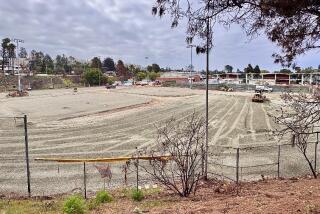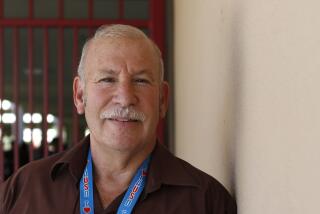Latinos Have Waited Long Enough for the Belmont Complex
- Share via
The poor neighborhoods around Belmont High School have been waiting 20 years for another secondary school to relieve student overcrowding. But that school has never opened, at least partly because the narrow agendas of politicians and interest groups keep getting in the way. So why should things be any different now?
On Tuesday, Los Angeles schools Supt. Roy Romer will ask the Board of Education to approve a plan to finish the new Belmont Learning Complex. That should be a no-brainer, since the new site is just a few blocks from 79-year-old Belmont High, where 5,000 students are jammed onto a campus designed for half that many.
With the can-do optimism that has characterized his brief tenure in Los Angeles, Romer is confident a school board that voted to shut down the project two years ago will give it another try. But rumors continue to circulate that powerful players in local school politics may try to delay the school’s opening for many more months, if not years. Such rumors cannot be easily dismissed.
The latest twist in the Belmont saga involves a possible standoff between the nonprofit group that wants to finish the Belmont Learning Complex and the district’s teachers union, United Teachers of Los Angeles.
Alliance for a Better Community, or ABC, is the nonprofit that says it can finish the already costly ($154 million) complex for an additional $68 million to $88 million, mitigating safety issues that halted the project in 1999.
ABC is a Latino education reform group organized two years ago by local community activists and corporate executives. It was created to protect the interests of Latino students--who make up 70% of the Los Angeles Unified School District--even as a newly elected school board majority began to shake up the LAUSD by, among other things, firing a popular Latino superintedent.
Rather than pushing to break up the district, as some angry Latino activists wanted, ABC opted to work for education reforms that would keep the interests of Latino kids foremost. The plan to complete the Belmont complex is ABC’s first big effort. The ever-pragmatic Romer will recommend ABC’s plan to the school board as the best of the proposals to finish the project.
Romer has done such a good job of laying the groundwork for reviving the project that some school board members who voted to close it down in 1999 now may vote to reopen it. That only makes the discordant note sounded by UTLA all the more jarring.
Teachers union officials are not opposed to finishing the new high school but worry about another part of ABC’s reform agenda: charter schools. The Latino reform group says it hopes to use the Belmont Learning Complex, when it finally opens, to experiment with charter schools--campuses supported by public funds but run like private schools under state charters.
UTLA President Day Higuchi says his union is not against charter schools per se but is “totally opposed” to Edison Schools Inc., the New York-based company advising ABC how to set up charter schools, because of labor problems it has had in other cities.
This is a risky stance for the UTLA. It will not look good for a white-collar union to stand as the last roadblock to a project desperately needed by the children of working-class immigrants whom many other local labor unions are trying to sign up as members.
But UTLA’s leaders are no fools. And the Latino leaders who founded ABC are as pragmatic and politically well connected as Romer, a former Colorado governor and former chair of the Democratic National Committee.
So I suspect a way will be found around UTLA’s objections--like putting off any discussion of charter schools until construction of the Belmont complex is finished.
But I can’t help but wonder if this final skirmish in the long fight to get the Belmont Learning Complex built isn’t also the first battle in an even bigger war: the fight to get Latino kids in Los Angeles the quality education they deserve, no matter who gets in the way.
*
Frank del Olmo is associate editor of The Times.
More to Read
Sign up for Essential California
The most important California stories and recommendations in your inbox every morning.
You may occasionally receive promotional content from the Los Angeles Times.













